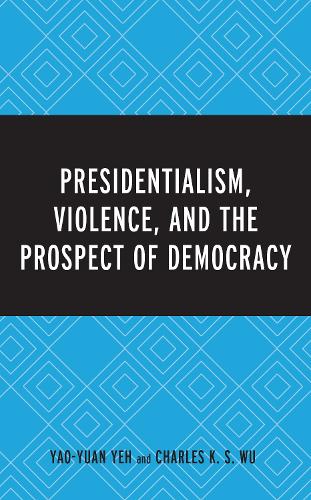
Presidentialism, Violence, and the Prospect of Democracy
(Hardback)
Publishing Details
Presidentialism, Violence, and the Prospect of Democracy
By (Author) Dr. Yao-Yuan Yeh
By (author) Charles K.S. Wu
Bloomsbury Publishing PLC
Lexington Books
10th February 2021
United States
Classifications
Professional and Scholarly
Non Fiction
Comparative politics
321.8042
Physical Properties
Hardback
134
Width 162mm, Height 241mm, Spine 16mm
372g
Description
This book tackles the perennial debate about whether presidentialism is associated with democratic breakdown. We integrate both institutional and behavioral arguments to discuss how institutional rigidity in changing executive power would stimulate citizens to adopt relatively violent means to address their grievances. Evidence from cross-national surveys is collected, and the results show that our central premises are indeed supported. We then employ a cross-national time-series data from 1946 to 2008 to examine the conditions in which a democracy enters into a crisis, and the conditions in which a crisis escalates into a democratic breakdown. Although the book finds evidence that presidentialism could contribute instabilities to a democratic system, it does not directly follow that those instabilities will trigger a democratic breakdown. In other words, presidential democracies are more likely to encounter crises than either parliamentary or semi-presidential systems. However, once a crisis occurs, presidentialism does not trigger a higher likelihood of a breakdown. The conventional wisdom is thus only half correct.
Reviews
Yao-Yuan Yeh and Charles Wus tour de force revisits and elaborates Juan Linzs classic argument about the perils of presidentialism by providing nuanced answers to the questions of why and how this institution generates distinct behavioral outcomes and political consequences compared to other institutions. This book not only enriches scholarly debates in the fields of comparative politics and political behavior, but also provides important policy implications for the changing prospects of democracies today.
-- Yen-Pin Su, National Chengchi UniversityIn Presidentialism, Violence, and the Prospect of Democracy, the authors engage in an important dialogue with scholars of democracy/democratization and constitutional engineering on the importance of the choice of institutional design in political performance. In this rigorous, systematic, and empirical work, Yeh and Wu provide even stronger support to the ever-growing doubts about the efficacy of presidentialism to deliver the desired democratic outcomes, especially for developing presidential democratic countries. This excellent work is a must-read inclusion in course syllabus of postgraduate seminars in contemporary democracies.
-- Alexander C. Tan, University of CanterburyAuthor Bio
Yao-Yuan Yeh is chair of the department of international studies and modern languages and associate professor of international studies at the University of St. Thomas, Houston
Charles K.S. Wu is doctoral candidate in the department of political science at Purdue University.
